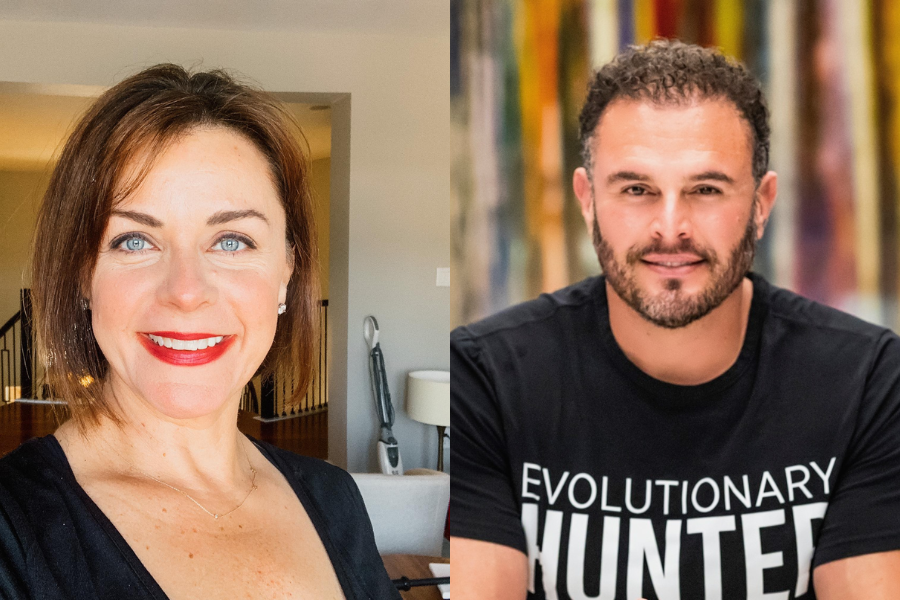Alex Charfen Billionaires Meditate: The Secret Weapon Of Billionaires And Entrepreneurs & More
In recent years, meditation has become more than just a practice associated with monks and yogis; it’s now embraced by some of the most successful people in the world, including billionaires and high-level entrepreneurs. The growing trend of meditation among the world’s wealthiest individuals has sparked interest, as many credit their personal and professional success to this ancient practice. One key advocate who has helped bring meditation into the entrepreneurial mainstream is Alex Charfen, a renowned performance coach and entrepreneur. Charfen has highlighted how meditation isn’t just a fleeting trend, but rather a powerful tool that can help individuals achieve unprecedented levels of success and personal growth.
The Rise of Meditation Among Billionaires
Meditation has seen a surge in popularity among billionaires and high-achieving individuals. Billionaires, often seen as the epitome of success, are realizing that achieving their goals is not only about working harder, but also about working smarter. The idea that meditation can help individuals improve their performance, emotional regulation, creativity, and focus has captured the attention of some of the world’s wealthiest individuals. According to Alex Charfen, billionaires meditate to harness their mental and emotional energy in a more effective way, enabling them to maintain their success without burning out.
But why exactly is meditation such a game-changer for these high achievers? The answer lies in its ability to enhance key attributes that are crucial to success, including focus, stress management, and innovative thinking.
Enhanced Focus and Productivity
Billionaires and entrepreneurs are frequently juggling multiple ventures, making decisions with high stakes, and managing large teams. For many, the demands of their professional lives can be overwhelming. However, meditation provides a sanctuary for the mind, sharpening focus and improving decision-making capabilities.
When practicing meditation, individuals learn to quiet their minds and center their attention. For billionaires, this practice helps them maintain clarity and avoid distraction, enabling them to make decisions with a greater sense of purpose. Meditation also encourages mindfulness, where individuals learn to stay present in the moment, which ultimately boosts productivity.
Alex Charfen often discusses the importance of focus in his teachings. According to Charfen, successful people need to train their minds to concentrate on what matters most and let go of the noise that can cloud judgment. Meditation is one of the most powerful tools for enhancing this level of focus.
Stress Reduction and Emotional Resilience
One of the most compelling reasons billionaires and entrepreneurs embrace meditation is its ability to reduce stress and enhance emotional resilience. The high-stress environments that many billionaires work in can lead to burnout, anxiety, and even health problems. Meditation offers an effective way to combat these challenges.
Regular practice helps to lower cortisol levels—the hormone associated with stress—while fostering a sense of calm and relaxation. This creates a powerful tool for managing the pressures that come with leadership and high-stakes decision-making.
In addition to stress reduction, meditation cultivates emotional resilience. It helps individuals manage their emotions, react with composure in difficult situations, and recover from setbacks quickly. For billionaires, this emotional strength is invaluable, allowing them to continue moving forward with confidence, even in the face of adversity.
Alex Charfen emphasizes the importance of emotional resilience for entrepreneurs. He believes that those who can maintain emotional balance are more likely to succeed in the long term because they can make sound decisions and stay motivated even during tough times.
Creativity and Innovation
Meditation has long been associated with heightened creativity. In today’s fast-paced world, where innovation is key to staying ahead of the competition, meditation helps entrepreneurs and billionaires unlock their creative potential.
The practice of mindfulness creates an environment in which the mind can let go of rigid thinking and explore new ideas. Through meditation, individuals can quiet their inner critic and embrace creative possibilities without fear of failure or judgment.
Many billionaires have credited meditation with helping them generate breakthrough ideas that have propelled their companies to new heights. For example, meditation has been key in helping entrepreneurs in Silicon Valley innovate and disrupt industries. Alex Charfen often speaks about the role of meditation in nurturing creativity, and how it can unlock fresh perspectives, especially in high-pressure situations.
Alex Charfen: A Pioneer in Performance Coaching
Alex Charfen is a leading performance coach who works with entrepreneurs to optimize their lives. His approach focuses on creating alignment between an individual’s goals, mindset, and actions. A central part of his philosophy is the power of mindfulness and meditation. Charfen integrates meditation into his coaching methods because he believes it is essential for personal and professional growth.
Charfen’s own journey has been shaped by the practice of meditation. Having overcome personal and professional challenges, he turned to meditation as a way to clear his mind, boost his energy, and foster emotional resilience. Today, Charfen teaches high-level entrepreneurs how to incorporate mindfulness into their daily routines to boost their performance.
Through his teachings, Alex Charfen has helped countless individuals achieve success by teaching them to balance ambition with mindfulness. His insights on how billionaires meditate are a testament to the transformative power of this practice.
The Science Behind Meditation’s Impact
The benefits of meditation are not just anecdotal; research has supported its positive impact on the brain, emotional well-being, and overall health. The science behind meditation’s effects explains why it has become such an essential tool for billionaires and high achievers.
- Neuroplasticity: Meditation rewires the brain, enhancing learning and adaptability. Studies show that regular meditation increases gray matter in areas of the brain related to memory, decision-making, and emotional regulation. This neuroplasticity allows individuals to think more clearly and adapt to new challenges more effectively.
- Stress Hormone Reduction: Mindfulness meditation has been shown to lower cortisol levels, reducing the body’s stress response. This helps individuals feel more relaxed, even in high-pressure situations.
- Improved Decision-Making: The prefrontal cortex, responsible for rational thinking and decision-making, becomes stronger with regular meditation. This improves an individual’s ability to make decisions based on logic and clarity, rather than being influenced by emotion or external pressures.
Billionaires Who Embrace Meditation
Several high-profile billionaires have openly discussed how meditation plays a role in their success. These individuals provide real-world examples of the transformative power of mindfulness. Here are some of the billionaires who integrate meditation into their daily routines:
- Ray Dalio: The founder of Bridgewater Associates, Dalio practices Transcendental Meditation daily. He credits the practice with helping him maintain balance and clarity, even during periods of intense stress.
- Arianna Huffington: Huffington, the founder of The Huffington Post, is a vocal advocate for mindfulness and meditation. She has spoken extensively about how meditation has improved her overall well-being and productivity.
- Jack Dorsey: The co-founder of Twitter and Square, Dorsey is known for his daily meditation practice. He believes that meditation helps him maintain mental clarity and emotional resilience, which are crucial for his demanding entrepreneurial lifestyle.
How Billionaires Meditate: Practices and Techniques
While billionaires may practice different forms of meditation, the core principles remain the same: mindfulness, presence, and focus. Some of the most popular meditation practices among high achievers include:
- Mindfulness Meditation: This practice involves focusing on the present moment, observing thoughts and feelings without judgment. It helps individuals become more aware of their surroundings and their internal state.
- Transcendental Meditation (TM): This involves the repetition of a mantra, which helps the mind enter a state of deep relaxation. TM is widely practiced by many high-profile billionaires, including Ray Dalio.
- Visualization: Some entrepreneurs use meditation to visualize their success, goals, and future achievements. This technique helps align the mind with desired outcomes.
The Daily Meditation Routine for Success
For those looking to follow in the footsteps of billionaires like Ray Dalio and Jack Dorsey, a structured meditation routine is essential for reaping the benefits. Here is a simple framework for integrating meditation into daily life:
- Start Small: Begin with just 5 to 10 minutes of meditation each day. This allows the practice to become part of your routine without feeling overwhelming.
- Choose a Comfortable Space: Find a quiet space where you can sit without distractions. Create an environment that promotes relaxation and focus.
- Focus on Breathing: Concentrate on your breath as you inhale and exhale. Deep, conscious breathing helps anchor the mind and brings attention back to the present.
- Gradually Increase Duration: As comfort with the practice grows, increase your meditation sessions to 15-20 minutes. The key is consistency and gradual improvement.
Why Entrepreneurs Should Follow ‘Alex Charfen Billionaires Meditate’
Entrepreneurs, much like billionaires, face high levels of uncertainty, pressure, and risk. Meditation offers them tools to manage these challenges and cultivate qualities that are essential for success. According to Alex Charfen, meditation is not just a practice but a way to create a foundation for success.
Meditation helps entrepreneurs develop resilience, clarity, and focus—all of which are necessary for navigating the complex and unpredictable world of business. By following the principles of “Alex Charfen Billionaires Meditate,” entrepreneurs can optimize their minds for peak performance.
Conclusion
The practice of meditation is transforming the way people approach success. For billionaires, entrepreneurs, and anyone seeking personal growth, meditation offers a pathway to balance, clarity, and innovation. Alex Charfen’s teachings emphasize the importance of mindfulness in achieving personal and professional growth. Through meditation, individuals can unlock their full potential, fostering resilience, focus, and creativity.
If you are looking to improve your life and career, consider adopting a daily meditation routine. Start small, remain consistent, and embrace the transformative power of mindfulness. Whether you are an entrepreneur, a leader, or simply someone looking for personal growth, the practice of meditation can help you achieve success, clarity, and peace of mind.
FAQs
1. What is the connection between Alex Charfen and billionaires who meditate?
Alex Charfen is a performance coach who has worked with high-level entrepreneurs and billionaires to optimize their lives and businesses. He incorporates meditation as a key tool in his coaching philosophy, emphasizing how mindfulness can help improve focus, productivity, emotional resilience, and creativity. Charfen advocates for the integration of meditation into daily routines, which he believes is vital for achieving success and maintaining mental clarity in high-pressure environments.
2. Why is meditation important for billionaires and entrepreneurs?
Meditation helps billionaires and entrepreneurs sharpen their focus, reduce stress, and foster creativity—qualities that are critical for success in the business world. By practicing mindfulness, individuals can improve decision-making, cultivate emotional resilience, and enhance mental clarity, all of which contribute to better leadership and overall well-being. Alex Charfen stresses that meditation provides the mental tools needed to navigate the pressures of entrepreneurship and high-stakes environments.
3. Which meditation techniques do billionaires use?
Billionaires use a variety of meditation techniques, with some of the most common practices being:
- Mindfulness Meditation: Focusing on the present moment and becoming aware of thoughts and feelings without judgment.
- Transcendental Meditation (TM): Repeating a mantra to reach deep relaxation and calm.
- Visualization: Using meditation to mentally visualize success and future goals.
Each technique helps entrepreneurs and billionaires reduce stress, increase focus, and unlock creativity.
4. How does meditation improve productivity?
Meditation improves productivity by enhancing focus and clarity. Through mindfulness, individuals learn to tune out distractions and focus on the task at hand, leading to better decision-making and efficiency. Regular meditation also improves emotional regulation, helping people stay calm and composed under pressure, which boosts productivity even during high-stress situations.
5. What are the mental health benefits of meditation for billionaires and entrepreneurs?
Meditation offers numerous mental health benefits, particularly in reducing stress, anxiety, and burnout. By lowering cortisol levels, meditation helps individuals manage the stress of running multiple businesses or leading large organizations. It also fosters emotional resilience, allowing billionaires and entrepreneurs to maintain emotional balance, bounce back from setbacks, and stay motivated.
6. Can meditation really help with creativity and innovation?
Yes, meditation is known to foster creativity and innovation. The practice helps clear the mind of clutter, allowing for new ideas and insights to emerge. For entrepreneurs and billionaires, meditation provides a space to let go of rigid thinking and explore novel solutions to challenges. Many successful innovators, particularly in Silicon Valley, credit their meditation practices for helping them develop breakthrough ideas.
7. How long should I meditate to see benefits?
It’s recommended to start with just 5-10 minutes of meditation daily. As you get more comfortable, you can gradually increase the duration to 15-20 minutes. Consistency is key. Even short, regular sessions can yield significant benefits over time, including improved focus, reduced stress, and increased creativity.
8. How do I create a daily meditation routine?
To create a successful daily meditation routine, consider the following steps:
- Start Small: Begin with 5-10 minutes each day to build consistency.
- Choose a Quiet Space: Find a distraction-free environment where you can sit comfortably.
- Focus on Breathing: Use deep, conscious breathing to help center your attention and calm your mind.
- Increase Duration Gradually: As you become more comfortable with the practice, increase your meditation time.
- Make it a Habit: Try to meditate at the same time every day to establish a routine.
9. What is the science behind meditation’s effects on the brain?
Research shows that meditation can significantly impact the brain in positive ways. Key findings include:
- Neuroplasticity: Meditation increases gray matter in the brain, which enhances memory, emotional regulation, and decision-making.
- Reduced Cortisol Levels: Meditation helps lower cortisol, the stress hormone, resulting in reduced stress and anxiety.
- Stronger Prefrontal Cortex: Meditation strengthens the prefrontal cortex, which is involved in rational thinking, problem-solving, and decision-making, leading to better choices and clearer thinking.
10. Do I need to be spiritual to meditate?
No, meditation is not just for spiritual purposes. While some people use meditation for spiritual growth, it is widely practiced as a tool for improving mental health, focus, creativity, and productivity. Many entrepreneurs and high-level professionals, including billionaires, use meditation as a practical tool to enhance their personal and professional lives.
11. Can entrepreneurs and billionaires still be successful without meditation?
While it is possible to be successful without meditation, many high achievers, including billionaires, report that meditation is a key part of their success. Meditation provides tools for managing stress, increasing focus, and fostering creativity—qualities that can help individuals navigate the challenges of entrepreneurship more effectively. Alex Charfen advocates for the integration of meditation into daily life as a strategy for maintaining balance and peak performance.
12. What should I do if I struggle to meditate?
If you struggle with meditation, don’t worry—it’s a common challenge, especially for beginners. Here are a few tips to help:
- Start with short sessions: Begin with just 5 minutes and gradually increase your meditation time.
- Use guided meditation: Consider using apps or online resources that provide guided meditations to help you stay on track.
- Be patient: It’s normal for the mind to wander during meditation. Gently bring your focus back to your breath without judgment.
- Experiment with different techniques: Try different types of meditation, such as mindfulness or transcendental meditation, to find what works best for you.
13. How can I integrate meditation into a busy lifestyle?
Meditation can be integrated into a busy lifestyle by starting with small, consistent sessions. You can meditate in the morning, during breaks, or even in between meetings. The key is to make it part of your daily routine, even if it’s just for a few minutes. Many entrepreneurs use meditation as a tool to reset and regain focus during their hectic schedules.
14. Can meditation help with decision-making?
Yes, meditation can significantly improve decision-making. By helping clear the mind and enhance focus, meditation allows individuals to make decisions with more clarity and confidence. Regular meditation strengthens the prefrontal cortex, the brain region responsible for rational thought, which improves decision-making abilities, particularly in high-pressure situations.






